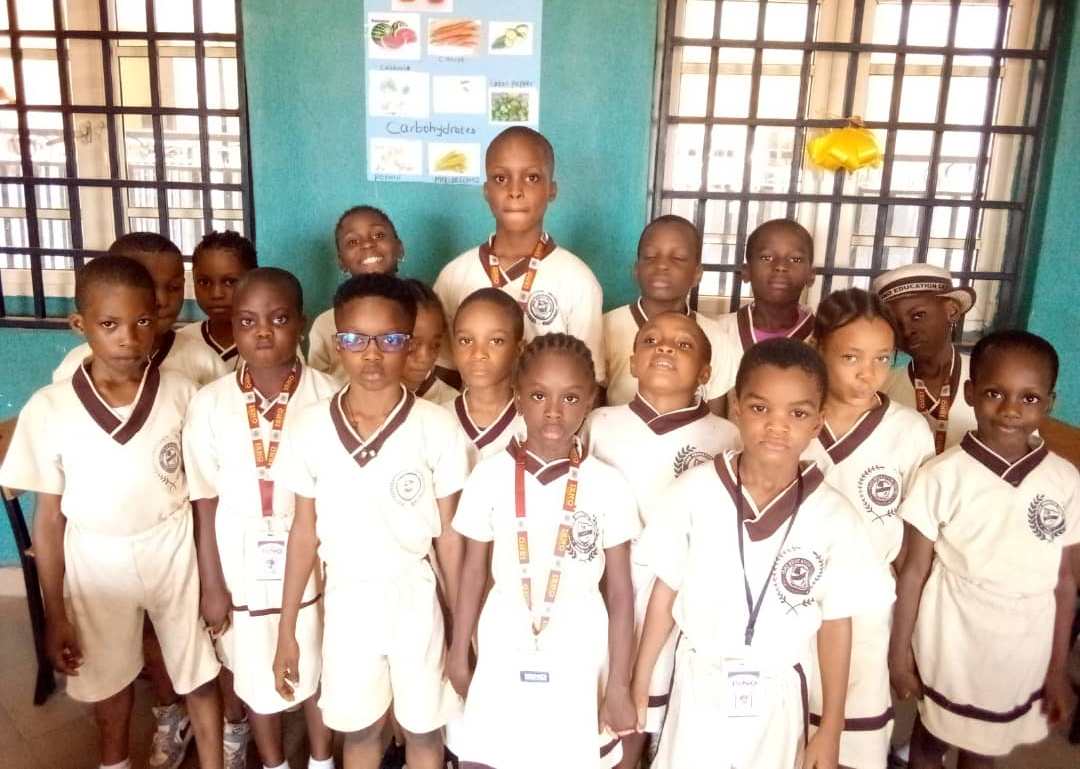 No.1 Imade
Street, Opp.Sogbeb Filling Stattion, Off Upper
Sakponba Road, Benin City Edo State, Nigeria
No.1 Imade
Street, Opp.Sogbeb Filling Stattion, Off Upper
Sakponba Road, Benin City Edo State, Nigeria email@isnoeducationcentre.org
email@isnoeducationcentre.org
Opening Hours : Monday to Friday - 7 Am to 5 Pm
Opening Hours : Monday to Friday - 7 Am to 5 Pm


Here, they are taught the basic foundation in education and we inculcate in the child the spirit of enquiry and creativity through the exploration of nature and the immediate environment. The use of educational toys is also of paramount importance here. The subjects taught in these classes include number work, letter work, play and sound, poems, social habit, health habit, science, Christian Religious Studies, creative arts and writing. It should be noted here that pupils in kindergarten 3 do some of the subjects in the primary school.
Mathematics (Number work)
English Language (Letter Work)
Writing
Creative and Cultural Arts
Science and Health Education
Social and Living Habits
Poems
Christian and Religious Studies
Primary Learning Summary
The primary section is divided into the lower basic (primary 1 to 3) and middle basic (Primary 4 to 5) classes. In this section there is the inculcation of permanent literacy and numeracy and the ability to communicate effectively. Also there is character and moral training and the development of sound attitude. Both the lower and middle basic classes offer subjects like mathematics and English Language etc. and other elective subjects.
Subjects offered in this section include:
English Language
Mathematics
Verbal Reasoning
Quantitative Reasoning
Basic Science
Computer Science
Social Studies
Creative and Cultural Arts
Home Economics
Vocational Studies
Mental Mathematics
Agricultural Science
Physical and Health Education
Christian Religious Studies
Civic Education
Phonics
French
Literature
The Junior Secondary Learning Summary
The Junior Secondary School is also known as the Upper Basic Classes. This is the highest stage of the Universal, Basic Education programme (UBE). The Federal governments policy is that compulsory education should end at this stage. The Junior Secondary School runs for three years at the end of which the students will write the Basic Education Certificate Examination ( BECE).
The Junior Secondary School prepares student for the senior secondary school. Their experimental skills are developed and personal initiatives are encouraged. The subjects offered are between thirteen and fifteen in number including core subjects like Mathematics and English Language and other elective subjects. Whichever subject, the school has decided to offer according to the new curriculum and is compulsory for all its junior secondary students.
Subjects for this sub-section
English Language
Mathematics
Basic Science
Social Studies
Agricultural Science
Computer Studies
Home Economics
Physical and Health Education
Business Studies
Civic Education
Christian Religious Studies
Cultural and Creative Arts
French
Edo Language
The Senior Secondary School Learning Summary
The senior secondary school also runs for three years. At this stage, the students should have decided on which course to study in the higher institution which informs their subject areas (Arts, Social Science or Science). This last three years are used to fine tune the skills of the students and equip them for a successful further education.
It is compulsory for all senior secondary one students to offer all the subjects in this class. At the end of the session, the students are given the choice to select the subjects they will offer in Senior Secondary two. They will however be guided by their performance in the various subjects and the course they intend to study in the higher institution. The students are to choose either nine or ten subjects (core and electives), students who are undecided about which subjects to choose are advised to meet the school counselors for advice.
Subjects for this sub-section includes
Mathematics
English Language
Chemistry
Physics
Biology
Geography
Commerce
Government
Agricultural Science
Christian Religious Studies
Literature in English
Computer Science
Civic Education
Economics
Further Mathematics
Marketing
Literature in English
Government
Christian Religious studies
Commerce